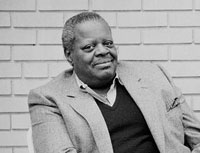Kidney failure kills jazz legend Oscar Peterson
Oscar Peterson's dazzling keyboard technique, commanding sense of swing and mastery of different piano styles could leave even his most accomplished peers awe-struck. His death brought forth tributes from jazz pianists spanning the generations. Oscar died of kidney failure at his home in Mississauga, Ontario, a western suburb of Toronto. He was 82.

Since the late 1950s, when Oscar Peterson gained worldwide recognition as one of the leading pianists in jazz, he played in a variety of settings: solo, duo, trio, quartet, small bands, and big bands. However, his solo piano recitals, as well as his solo piano recordings were rare, until he chose to make a series of solo albums titled "Exclusively for my friends." These solo piano sessions, made for the MPS label, were Peterson's response to the emergence of such stars as Bill Evans and McCoy Tyner.
Some cognoscenti assert that Peterson's best recordings were made for the MPS label in the late 1960s and early 1970s. For some years subsequently he recorded for Granz's Pablo Records after the label was founded in 1973 and in more recent years for the Telarc label.
In the 1980s he played successfully in a duo with pianist Herbie Hancock. In the 1990s Peterson made performances and recordings with his protege Benny Green
Oscar Peterson wrote pieces for piano, for trio, for quartet and for big band. He also wrote several songs, and made recordings as a singer. Probably his best-known composition is "Canadiana Suite."
Oscar Peterson taught piano and improvisation in Canada, mainly in Toronto. He also published his original jazz piano etudes for practice. However, he asked his students to study the music of Johann Sebastian Bach, especially the Well Tempered Clavier, the Goldberg Variations, and the The Art of Fugue, considering this piano pieces essential for every serious pianist.
Peterson had arthritis since his youth, and in later years could hardly button his shirt. He also had hip replacement surgery in the early 1990s. Although the surgery was successful, his mobility suffered.
Somewhat later, in 1993, Peterson suffered a serious stroke that weakened his left side and sidelined him for two years. Also in 1993 incoming Prime Minister and longtime Peterson fan and friend Jean Chrétien offered Peterson the position of Lieutenant-Governor of Ontario, but according to Chrétien he declined, citing the health problems from his recent stroke.
After the stroke, Peterson was recuperating for about two years. He gradually regained mobility and control of his hand. However, his virtuosity was never restored to the original level. In 1995 he returned to public performances on a limited basis, and also made several live and studio recordings for the Telarc label. In 1997 he received a Grammy for Lifetime Achievement and an International Jazz Hall of Fame Award, another indication that Peterson continued to be regarded as one of the greatest jazz musicians ever to play.
In 2003, Peterson recorded the DVD A Night in Vienna for the Verve label. He continued to tour the U.S. and Europe, though maximally one month a year, with a couple of days rest between concerts to recover his strength. His accompanists consisted of Ulf Wakenius (guitar), David Young (bass) and Alvin Queen (drums), all leaders of their own groups.
Source: wiki
Subscribe to Pravda.Ru Telegram channel, Facebook, RSS!


